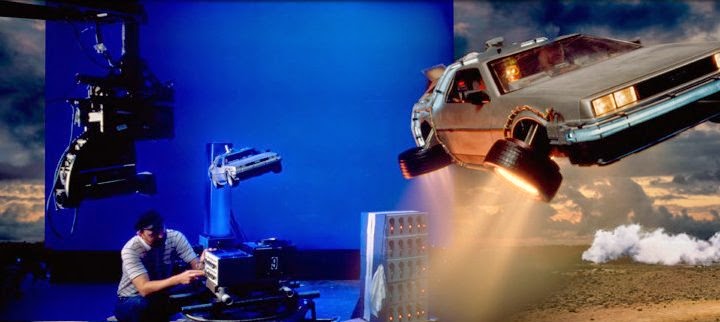Tuesday, October 28, 2014
Monday, October 27, 2014
Academy Originals: Rick Baker
Labels:
film history,
rick baker,
special effects,
vfx
Wednesday, October 22, 2014
Massive Gallery of Vehicle Models Build by ILM for Star Wars Trilogy (1977-1983)

140 up-close photos of ship and vehicle models constructed by ILM for the Original Star Wars Trilogy (1977-1983)
Labels:
film,
film history,
george lucas,
ILM,
model shop,
models,
star wars,
vfx,
vfx history
Tuesday, October 21, 2014
Big Hero 6 Character Animation Tests
Labels:
animation,
big hero 6,
character animation,
character test,
disney
Friday, October 17, 2014
Paddington Featurette: "Page To Screen"
Here's a great featurette about the project we've been working on here at Framestore. It's been a lot of fun animating this little guy!
Labels:
animation,
behind the scenes,
David Heyman,
featurette,
pablo grillo,
paddington,
paul king,
vfx
Thursday, October 16, 2014
The Boxtrolls - End Credit Sequence
Labels:
2d animation,
boxtrolls,
laika studio
Tuesday, October 14, 2014
The Silence of the Lambs: Who Wins the Scene?
Here's a solid shot by shot breakdown by Tony Zhou (Every Frame A Painting) of a scene from The Silence of the Lambs. An amazing amount thought, planning and staging went into this scene where Jodie Foster and Anthony Hopkins' characters meet for the first time. This is a great example of how important cinematography is to enhancing emotion and telling the story. Brilliant! Thanks to Tony for posting it!
Also check out:
// The Silence of the Lambs: The Inside Story
Ben Burtt Offers Career Advise to Aspiring Sound Designers
Great career advise for aspiring artists from sound designer Ben Burtt.
Great article over on WIRED:
// Ben Burtt on Star Wars, Forbidden Planet and the Sound of Sci-Fi
Also:
// Sound Design - Star Wars Episode II
Great article over on WIRED:
// Ben Burtt on Star Wars, Forbidden Planet and the Sound of Sci-Fi
Also:
// Sound Design - Star Wars Episode II
Sunday, October 12, 2014
BJ Crawford Animation Tests
More great animation tests over on BJ's vimeo channel:
// BJ Crawford
Also, check out his blog here:
// BJ and the Blog
Great interview with BJ explaining his animation process over on 11 Second Club:
// BJ 11 Second Club Interview
// BJ Crawford
Also, check out his blog here:
// BJ and the Blog
Great interview with BJ explaining his animation process over on 11 Second Club:
// BJ 11 Second Club Interview
Labels:
2d animation,
animation test,
bj crawford,
blue sky,
ice age,
Pencil Test,
test
Friday, October 10, 2014
Behind The Scenes Friday: Back to the Future - Secrets Of (1985)
Thursday, October 09, 2014
The Tale of Princess Kaguya: Interview with Isao Takahata co-founder of Studio Ghibli
"Isao Takahata is a Japanese film director, animator, screenwriter and producer who has earned critical international acclaim for his work as a director of anime films. Takahata is the co-founder of Studio Ghibli along with long-time collaborative partner Hayao Miyazaki. He has directed films such as the war-themed Grave of the Fireflies, the romantic drama Only Yesterday, the ecological adventure Pom Poko, and the comedy My Neighbors the Yamadas. Unlike most anime directors, Takahata does not draw and never worked as an animator before becoming a full-fledged director." More info on Wikipedia
Tuesday, October 07, 2014
Moonbot: The Making of Silent, a Short Film

Here's an excellent behind the scenes look at the making of Silent by Moonbot Studios
Dolby Presents: Silent, a Short Film
Monday, October 06, 2014
Destiny Videos - Cutscenes from the Game
This library contains all of the cutscenes included in Destiny the video game
// Destiny Videos - Cutscenes from the Game
Labels:
animation,
bungie,
cinematic,
games,
video game
Don’t Follow Your Passion, But Always Bring it With You
I just read this tough response from Mike Rowe to a guy in Alabama who asked why he shouldn't follow is passion. I agree with most of what Mike says. It's powerful stuff and I love this line 'In a world where everyone gets a trophy, encouragement trumps honesty, and realistic expectations go out the window.'
Full article here:
// Mike Rowe’s must-read response to an Alabamian who asked why he shouldn’t follow his passion via Yellowhammer
'Hi Stephen
A few years ago, I did a special called “The Dirty Truth.” In it, I challenged the conventional wisdom of popular platitudes by offering “dirtier,” more individualistic alternatives. For my inspiration, I looked to those hackneyed bromides that hang on the walls of corporate America. The ones that extoll passersby to live up to their potential by “dreaming bigger,” “working smarter,” and being a better “team player.” In that context, I first saw “Follow Your Passion” displayed in the conference room of a telemarketing firm that employed me thirty years ago. The words appeared next to an image of a rainbow, arcing gently over a waterfall and disappearing into a field of butterflies. Thinking of it now still makes me throw up in my mouth.
Like all bad advice, “Follow Your Passion” is routinely dispensed as though it’s wisdom were both incontrovertible and equally applicable to all. It’s not. Just because you’re passionate about something doesn’t mean you won’t suck at it. And just because you’re determined to improve doesn’t mean that you will. Does that mean you shouldn’t pursue a thing you’re passionate about?” Of course not. The question is, for how long, and to what end?
When it comes to earning a living and being a productive member of society – I don’t think people should limit their options to those vocations they feel passionate towards. I met a lot of people on Dirty Jobs who really loved their work. But very few of them dreamed of having the career they ultimately chose. I remember a very successful septic tank cleaner who told me his secret of success. “I looked around to see where everyone else was headed, and then I went the opposite way,” he said. “Then I got good at my work. Then I found a way to love it. Then I got rich.”
Every time I watch The Oscars, I cringe when some famous movie star – trophy in hand – starts to deconstruct the secret to happiness. It’s always the same thing, and I can never hit “mute” fast enough to escape the inevitable cliches. “Don’t give up on your dreams kids, no matter what.” “Don’t let anyone tell you that you don’t have what it takes.” And of course, “Always follow your passion!”
Today, we have millions looking for work, and millions of good jobs unfilled because people are simply not passionate about pursuing those particular opportunities. Do we really need Lady GaGa telling our kids that happiness and success can be theirs if only they follow their passion?
There are many examples – including those you mention – of passionate people with big dreams who stayed the course, worked hard, overcame adversity, and changed the world though sheer pluck and determination. We love stories that begin with a dream, and culminate when that dream comes true. And to your question, we would surely be worse off without the likes of Bill Gates and Thomas Edison and all the other innovators and Captains of Industry. But from my perspective, I don’t see a shortage of people who are willing to dream big. I see people struggling because their reach has exceeded their grasp.
I’m fascinated by the beginning of American Idol. Every year, thousands of aspiring pop-stars show up with great expectations, only to learn that they don’t have anything close to the skills they thought they did. What’s amazing to me, isn’t their lack of talent – it’s their lack of awareness, and the resulting shock of being rejected. How is it that so many people are so blind to their own limitations? How did these peope get the impression they could sing in the first place? Then again, is their incredulity really so different than the surprise of a college graduate who learns on his first interview that his double major in Medieval Studies and French Literature doesn’t guarantee him the job he expected? In a world where everyone gets a trophy, encouragement trumps honesty, and realistic expectations go out the window.
When I was 16, I wanted to follow in my grandfathers footsteps. I wanted to be a tradesman. I wanted to build things, and fix things, and make things with my own two hands. This was my passion, and I followed it for years. I took all the shop classes at school, and did all I could to absorb the knowledge and skill that came so easily to my granddad. Unfortunately, the handy gene skipped over me, and I became frustrated. But I remained determined to do whatever it took to become a tradesman.
One day, I brought home a sconce from woodshop that looked like a paramecium, and after a heavy sigh, my grandfather told me the truth. He explained that my life would be a lot more satisfying and productive if I got myself a different kind of toolbox. This was almost certainly the best advice I’ve ever received, but at the time, it was crushing. It felt contradictory to everything I knew about persistence, and the importance of “staying the course.” It felt like quitting. But here’s the “dirty truth,” Stephen. “Staying the course” only makes sense if you’re headed in a sensible direction. Because passion and persistence – while most often associated with success – are also essential ingredients of futility.
That’s why I would never advise anyone to “follow their passion” until I understand who they are, what they want, and why they want it. Even then, I’d be cautious. Passion is too important to be without, but too fickle to be guided by. Which is why I’m more inclined to say, “Don’t Follow Your Passion, But Always Bring it With You.”
Carry On
Mike'
Full article here:
// Mike Rowe’s must-read response to an Alabamian who asked why he shouldn’t follow his passion via Yellowhammer
'Hi Stephen
A few years ago, I did a special called “The Dirty Truth.” In it, I challenged the conventional wisdom of popular platitudes by offering “dirtier,” more individualistic alternatives. For my inspiration, I looked to those hackneyed bromides that hang on the walls of corporate America. The ones that extoll passersby to live up to their potential by “dreaming bigger,” “working smarter,” and being a better “team player.” In that context, I first saw “Follow Your Passion” displayed in the conference room of a telemarketing firm that employed me thirty years ago. The words appeared next to an image of a rainbow, arcing gently over a waterfall and disappearing into a field of butterflies. Thinking of it now still makes me throw up in my mouth.
Like all bad advice, “Follow Your Passion” is routinely dispensed as though it’s wisdom were both incontrovertible and equally applicable to all. It’s not. Just because you’re passionate about something doesn’t mean you won’t suck at it. And just because you’re determined to improve doesn’t mean that you will. Does that mean you shouldn’t pursue a thing you’re passionate about?” Of course not. The question is, for how long, and to what end?
When it comes to earning a living and being a productive member of society – I don’t think people should limit their options to those vocations they feel passionate towards. I met a lot of people on Dirty Jobs who really loved their work. But very few of them dreamed of having the career they ultimately chose. I remember a very successful septic tank cleaner who told me his secret of success. “I looked around to see where everyone else was headed, and then I went the opposite way,” he said. “Then I got good at my work. Then I found a way to love it. Then I got rich.”
Every time I watch The Oscars, I cringe when some famous movie star – trophy in hand – starts to deconstruct the secret to happiness. It’s always the same thing, and I can never hit “mute” fast enough to escape the inevitable cliches. “Don’t give up on your dreams kids, no matter what.” “Don’t let anyone tell you that you don’t have what it takes.” And of course, “Always follow your passion!”
Today, we have millions looking for work, and millions of good jobs unfilled because people are simply not passionate about pursuing those particular opportunities. Do we really need Lady GaGa telling our kids that happiness and success can be theirs if only they follow their passion?
There are many examples – including those you mention – of passionate people with big dreams who stayed the course, worked hard, overcame adversity, and changed the world though sheer pluck and determination. We love stories that begin with a dream, and culminate when that dream comes true. And to your question, we would surely be worse off without the likes of Bill Gates and Thomas Edison and all the other innovators and Captains of Industry. But from my perspective, I don’t see a shortage of people who are willing to dream big. I see people struggling because their reach has exceeded their grasp.
I’m fascinated by the beginning of American Idol. Every year, thousands of aspiring pop-stars show up with great expectations, only to learn that they don’t have anything close to the skills they thought they did. What’s amazing to me, isn’t their lack of talent – it’s their lack of awareness, and the resulting shock of being rejected. How is it that so many people are so blind to their own limitations? How did these peope get the impression they could sing in the first place? Then again, is their incredulity really so different than the surprise of a college graduate who learns on his first interview that his double major in Medieval Studies and French Literature doesn’t guarantee him the job he expected? In a world where everyone gets a trophy, encouragement trumps honesty, and realistic expectations go out the window.
When I was 16, I wanted to follow in my grandfathers footsteps. I wanted to be a tradesman. I wanted to build things, and fix things, and make things with my own two hands. This was my passion, and I followed it for years. I took all the shop classes at school, and did all I could to absorb the knowledge and skill that came so easily to my granddad. Unfortunately, the handy gene skipped over me, and I became frustrated. But I remained determined to do whatever it took to become a tradesman.
One day, I brought home a sconce from woodshop that looked like a paramecium, and after a heavy sigh, my grandfather told me the truth. He explained that my life would be a lot more satisfying and productive if I got myself a different kind of toolbox. This was almost certainly the best advice I’ve ever received, but at the time, it was crushing. It felt contradictory to everything I knew about persistence, and the importance of “staying the course.” It felt like quitting. But here’s the “dirty truth,” Stephen. “Staying the course” only makes sense if you’re headed in a sensible direction. Because passion and persistence – while most often associated with success – are also essential ingredients of futility.
That’s why I would never advise anyone to “follow their passion” until I understand who they are, what they want, and why they want it. Even then, I’d be cautious. Passion is too important to be without, but too fickle to be guided by. Which is why I’m more inclined to say, “Don’t Follow Your Passion, But Always Bring it With You.”
Carry On
Mike'
Thursday, October 02, 2014
The Hidden Patterns Created by Animals in Flight
Check out this article about flight patterns over on io9
// The Hidden Patterns Created by Animals in Flight
More reference // Perfectionists: Rufus - The Real Hawk-Eye
// The Hidden Patterns Created by Animals in Flight
More reference // Perfectionists: Rufus - The Real Hawk-Eye
Wednesday, October 01, 2014
How Codecs Work
Great article about codecs from no film school and video tutorial by David Kong.
// Confused About Codecs? This Video Tutorial Will Teach You What You Need to Know
Labels:
codec,
compression,
david kong,
Tech,
video,
video codecs
Interview with Artst Glenn Vilppu
Labels:
drawing,
fundamentals,
Glenn Vilppu,
sketches,
sketching
Subscribe to:
Comments (Atom)
















